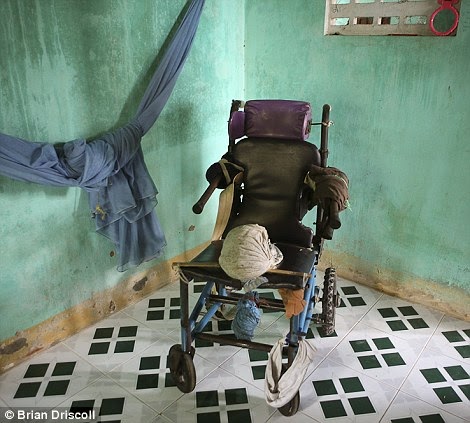By SNEJANA FARBEROV
24 August 2013
They were born decades after American forces had sprayed the herbicide dioxin Agent Orange in South Vietnam, but some children living in the region today continue to suffer from the horrifying effects of the chemical.
New York City-based photographer Brian Dricscoll traveled to Vietnam to document the everyday struggles of third generation Agent Orange victims battling dozens of serious ailments, physical deformities and mental disorders.
Driscoll was inspired to take up this difficult topic by his uncle, a Vietnam War veteran who may have been one of estimated 2.6 million U.S. soldiers believed to have been exposed to Agent Orange in the 1960s.
Image 1
Deformed: Nguyen and Hung Vuong Pham, 14, and 15, await their daily bathing in the Kim Dong district of Hai Phong, Vietnam. Their days are occupied watching people pass by the front area of their home (left)
|
Image 2
Lost generation: Third generation Agent Orange victim Nguyen Pham, 11, deaf, blind and cannot speak has been bed ridden for a great portion of his life (above)
|
Lost generation: a makeshift wheel chair for a victim of Agent Orange, in the Phuong Son district, Nha Trang (above)
|
Image 4
Perpetual suffering: Former Viet Cong soldier and father, stands behind his son Nguyen Van Dung, 12, at home in the Kim Dong district of Hai Phong, Vietnam. Nguyen is tied by the hands because he compulsively tears at his own face. (left)
Image 5
Innocent: Huong Nghiem, 8, third generation Agent Orange victim, is being held by her mother in the door way of their home in the Tran Cao Van district, Hoi An. (left)
The American photographer traveled to Hanoi and tracked down a group of young Vietnamese whose health has been ravaged by the chemical, the site Feature Shoot reported.
For three weeks, Mr Driscoll made his way south through remote villages, ending his journey in Nha Trang about 640 miles from the capital.
During his travels, Driscoll got to meet and take pictures of teenagers and children as young as 5 suffering from debilitating conditions, among them Nguyen Pham, 11, who is deaf, blind and mute. The boy has been bed-ridden for most of his life.
Agent Orange is the combination of the code names for Herbicide Orange and Agent LNX, one of the herbicides and defoliants used by the U.S. military as part of its chemical warfare program, Operation Ranch Hand, during the Vietnam War from 1961 to 1971.
In the course of 10 years, American forces sprayed nearly 20 million gallons of the chemical in Vietnam, Laos and parts of Cambodia in an effort to deprive guerrilla fighters of cover by destroying plants and trees where they could find refuge.
Image 6
Daily torment: Nguyen Quang, 11, on his bed at home in the Kim Dong district of Hai Phong. Village leaders believe most of the children to be third generation Agent Orange victims due to the commonality in mental disorders and physical deformities. (left)
Image 7
The forgotten: Suffering from a distorted reality, Nguyen Tran Ho, 11, gazes out from his bed (left)
Image 8
The forgotten: Thom Le Pham (left) gives a look of despair at home in the Benh Vien district, Danang Vietnam
Image 9
Heart-wrenching sight: Phirum Ung, 5, third generation Agent Orange victim, naps in a hammock at home in Beng Melea Province, Cambodia. Most days are spent with his mother pan-handling at the Angkor Wat Temples. (left)
Image 10
Family: A mother of an Agent Orange victim at home in Kim Dong district of Nhat Tan, Vietnam. (left)
The chemical was manufactured for the U.S. Department of Defense by Monsanto Corporation and Dow Chemical. It got its name from the color of the orange-striped 55-gallon barrels in which it was shipped to Asia.
Jeanne Stellman, of the Columbia University Mailman School of Public Health, estimated that up to 4.5 million Vietnamese were living in the 3,181 villages that were directly in the spray paths and were potentially exposed to the herbicide.
According to the Vietnam Red Cross, about 1 million Vietnamese have been affected by Agent Orange, including 150,000 children suffering from birth defects, CNN reported.
Image 11
Shadow: Le Sinh, 14, Agent Orange victim, looks out from the lanai at home in the Benh Vien district, Da Nang. (left)
|
|
|
|
Image 12 Image 13
Shocking figures: The Vietnam Red Cross estimated that about 1 million Vietnamese have been affected by Agent Orange, including 150,000 children suffering from birth defects. (above left & right)
|
|
Image 14
Bucolic setting: The house of Nguyen Pham, 11, an Agent Orange victim, in the district of Chi Linh, Vietnam. (left)
Image 15
One day at a time: A mother at home cares for her child who is affected by Agent Orange. Quang Ninh district. (left)
The U.S. government, however, has dismissed these figures as unreliable and inflated.
Among the illnesses contracted by people exposed to the dioxin are non-Hodgkin’s lymphoma, several varieties of cancer, type 2 diabetes, soft tissue sarcoma, birth defects in children, spina bifida and reproductive abnormalities, to name a few.
Earlier this month, the Association for Victims of Agent Orange in Ho Chi Minh City has filed its fourth lawsuit against American chemical companies that produced Agent Orange.















No comments:
Post a Comment